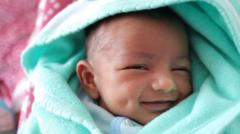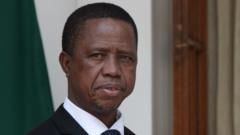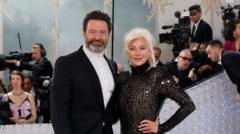As Cardinal Pablo Virgilio David prepares for the conclave in Rome, he reflects on his unexpected rise to a position of influence for a humble bishop committed to the urban poor in the Philippines.
Filipino Cardinal David: A Voice for the Marginalized in the Conclave

Filipino Cardinal David: A Voice for the Marginalized in the Conclave
Cardinal David, appointed by Pope Francis, joins the conclave amid ongoing struggles for the Catholic Church in the Philippines.
Cardinal Pablo Virgilio David, one of three cardinals representing the Philippines in the papal conclave, candidly spoke with the BBC about his astonishing journey to cardinalship, describing it as unimaginable. “Apu Ambo,” as he is affectionately known, is not an archbishop but a bishop from a diocese largely composed of impoverished communities. His elevation aligns with Pope Francis' vision of a more grounded church, emphasizing a connection to the marginalized.
Having served as a cardinal for just five months, David embodies the essence of Pope Francis' legacy, which aimed to revive the Catholic Church by bridging its gap with the populace. The Philippines, with nearly 80% of its 100 million citizens identifying as Roman Catholic, faces numerous challenges, including attacks on church doctrines, as modern politics clash with traditional beliefs.
Pope Francis’ visit restored hope within the Filipino clergy, even as the church struggles against pressing issues like the drug war perpetrated by former President Rodrigo Duterte. Cardinal David courageously spoke out against this violent campaign, drawing death threats but also support from Pope Francis himself. His efforts in the community included providing refuge to those endangered and promoting drug rehabilitation, often at great personal risk.
Historically, the church in the Philippines has been both a source of power and a target of social unrest. Despite its vibrant presence, the influence of the Catholic Church appears to be dwindling, as evidenced by legislative victories on reproductive health and divorce rights, which lack the church's approval. Cardinal David's perspective on governance advocates for a complementary relationship between the church and state.
The rise of progressive voices within Congress, like Geraldine Roman, signifies a broader shift as well. Roman highlights the church's resistance to divorce legislation while also benefiting from a more inclusive environment fostered by Pope Francis. Meanwhile, a significant decline in regular mass attendance raises additional concerns regarding the church’s future outreach and relevance.
Church scandals and issues of credibility challenge leaders like Cardinal David to embrace humility and foster connections to regain moral authority. “Dare to be vulnerable,” he recalls Pope Francis advising, illustrating a path forward for the church in regaining public trust.
As Cardinal David takes part in the conclave to select the next pope, his journey reflects a moment of hope blended with the reality of the Catholic Church’s evolving role in society. His commitment to the community and voicing the concerns of the disenfranchised could set a new course for the Vatican.
Having served as a cardinal for just five months, David embodies the essence of Pope Francis' legacy, which aimed to revive the Catholic Church by bridging its gap with the populace. The Philippines, with nearly 80% of its 100 million citizens identifying as Roman Catholic, faces numerous challenges, including attacks on church doctrines, as modern politics clash with traditional beliefs.
Pope Francis’ visit restored hope within the Filipino clergy, even as the church struggles against pressing issues like the drug war perpetrated by former President Rodrigo Duterte. Cardinal David courageously spoke out against this violent campaign, drawing death threats but also support from Pope Francis himself. His efforts in the community included providing refuge to those endangered and promoting drug rehabilitation, often at great personal risk.
Historically, the church in the Philippines has been both a source of power and a target of social unrest. Despite its vibrant presence, the influence of the Catholic Church appears to be dwindling, as evidenced by legislative victories on reproductive health and divorce rights, which lack the church's approval. Cardinal David's perspective on governance advocates for a complementary relationship between the church and state.
The rise of progressive voices within Congress, like Geraldine Roman, signifies a broader shift as well. Roman highlights the church's resistance to divorce legislation while also benefiting from a more inclusive environment fostered by Pope Francis. Meanwhile, a significant decline in regular mass attendance raises additional concerns regarding the church’s future outreach and relevance.
Church scandals and issues of credibility challenge leaders like Cardinal David to embrace humility and foster connections to regain moral authority. “Dare to be vulnerable,” he recalls Pope Francis advising, illustrating a path forward for the church in regaining public trust.
As Cardinal David takes part in the conclave to select the next pope, his journey reflects a moment of hope blended with the reality of the Catholic Church’s evolving role in society. His commitment to the community and voicing the concerns of the disenfranchised could set a new course for the Vatican.























